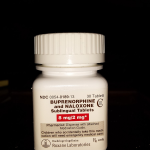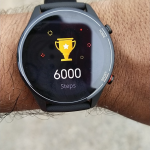Last year, Congress passed the Mainstreaming Addiction Treatment (MAT) Act, seeking to expand access to buprenorphine, a proven treatment for opioid use disorder. However, a recent proposal by the Drug Enforcement Administration threatens to undermine Congress' intention. Now, some members of Congress appear ready to push back.
Harm Reduction
Tracking our health is all the rage. Advancements in technology have catapulted our understanding of how our bodies work and continue to provide new opportunities for healthcare. But while constant monitoring of our physical health sounds great, there may be drawbacks to our mental health and how we relate to our bodies and other people.
Our behavior seems to be built by evolution, and it's sometimes paradoxical. To borrow from the hard sciences, our behavior exhibits complementarity. We are largely felicitous to our family and friends, yet stand-offish (if not aggressive) to “others” we may encounter. Willful ignorance straddles that complementarity borderline. A new study offers insight into what's really going on.
Much of the blood drawn for laboratory analysis is wasted. In a clinical setting where your blood is being taken multiple times a day, wouldn't it be better for the laboratory to use a smaller amount – and let you keep the difference?
Child abuse manifests in various forms. One is the “Shaken Baby,” where rapid head shaking allegedly causes neurological injury and death. Until recently, a constellation of bodily injuries was considered adequate evidence to convict an indicted abuser. No longer. Recent cases have held that “Shaken Baby Syndrome” is not a valid diagnosis. One court just held the diagnosis should be a legal determination – not a medical one, rejecting all medical testimony and exonerating alleged abusers.
To handshake or not to handshake, that is the question. As COVID-19 has moved from a pandemic to an endemic disease, should we greet each other with a shake of hands, fist bump, or just eye contact and walk quickly away? Handshaking has devolved into a cultural debate rather than the scientific issue of disease transmission. Is handshaking, a form of surface transmission, something to fear?
"[A] censorious report on National Public Radio, citing a poll, accuses Republican voters of being content to 'do nothing' about climate change. In fact, neither party proposes to do anything about climate change. Democrats propose to spend a lot more money doing nothing.” – Holman Jenkins, Wall Street Journal
Are you aware of the concept of the three gates? Most simply, before you speak or – in my case, write – let your words pass through three gates. Is it true? Is it kind? Is it necessary?
In the past week, two Senators questioned a planned study by the FDA on long-acting opioids. They write, “This study is intended to specifically look at the use of EERWs [enrichment enrollment randomized withdrawal] to approve new opioids.” That is not all they got wrong.
“Oregonians voted in November 2020 to stop incarcerating people for using drugs unapproved by the federal government and instead direct resources to harm reduction programs. The pandemic got in the way. Now, while this project is still in its infancy, a group of Oregonians wants to replace something that hasn’t had a chance to work with something that we KNOW hasn’t and won’t work.”
Much has been written about Diversity, Equity, and Inclusion (DEI). Many who are adamant about diversity, especially in regulatory science, are less enthused over equity. I’ve had a few thoughts about both.
The Cochrane Library recently completed a review of “the comparative benefits, harms and tolerability of different smoking cessation pharmacotherapies and e-cigarettes, when used to help people stop smoking tobacco.” Spoiler alert: as we have shown, e-cigarettes are a significant aid in reducing dependency on smoking tobacco.











